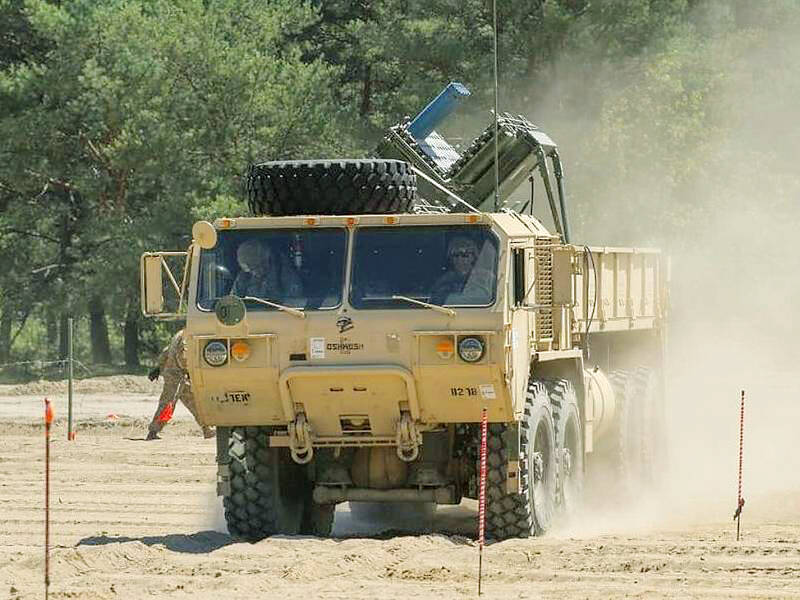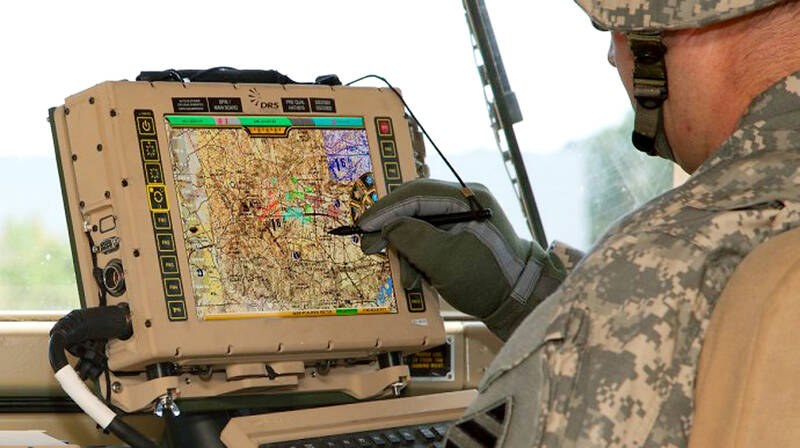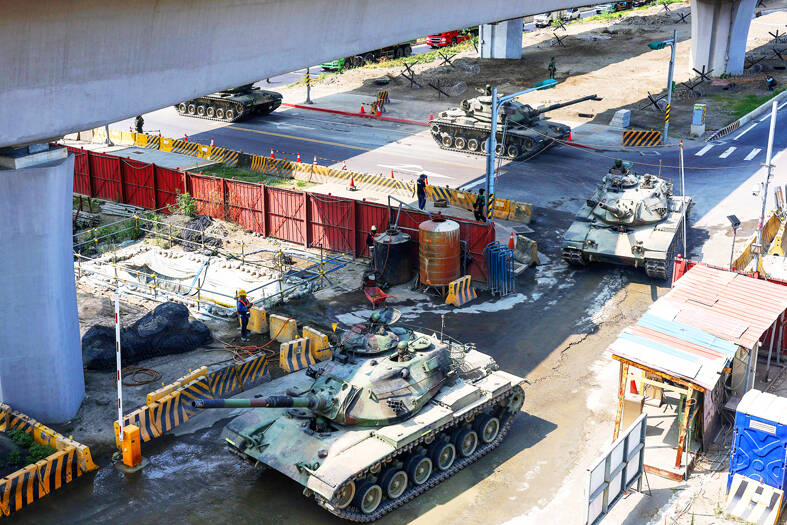The Ministry of National Defense (MND) yesterday thanked the US after Washington approved the sale of a US$180 million arms package, mainly involving a minelaying system.
The sale includes the M136 “Volcano” automated mine delivery system and the M977A4 HEMTT 10-tonne cargo trucks on which the system would be mounted, the ministry said.
Developed in the 1980s, the system can be mounted on ground vehicles or helicopters and uses prepackaged mine canisters that contain multiple anti-personnel and anti-tank mines that can be dispersed over large areas.

Photo: Screengrab from US Army website
The equipment would significantly boost Taiwan’s asymmetrical warfare capabilities, as it enables more efficient anti-tank mine placement, the ministry said.
The sale embodies Washington’s commitment to ensuring that Taiwan can defend itself, as stated by the Taiwan Relations Act and the “six assurances,” the ministry said, expressing its “sincere gratitude” to the US.
The ministry added that arms sales are likely to be formally confirmed by the US Congress within a month.

Photo: Screengrab from US Army website
The Executive Yuan approved the proposal to buy the minelaying system last year, an unnamed military source told the Central News Agency earlier this year.
The Ministry of Foreign Affairs said the latest deal is the eighth arms sale to Taiwan by the administration of US President Joe Biden, which “fully demonstrates the US government’s high regard for Taiwan’s defense capabilities.”
The US Defense Security Cooperation Agency announced the proposed sale on Wednesday.

Photo: CNA
“The proposed sale will improve the recipient’s capability to meet current and future threats by providing a credible force capable of deterring adversaries and participating in regional operations,” the agency said in a statement.
The weapons package also includes M87A1 anti-tank munitions, M88 canister training munitions and M89 training munitions, as well as related logistics support and technical assistance.
According to the US Federal Procurement Data System, there are plans to supply Taiwan with the International Field Artillery Tactical Data System (IFATDS), the international version of the US Army’s Advanced Field Artillery Tactical Data System.
The system increases the lethality of the M142 High Mobility Artillery Rocket Systems by providing a secure communications system combining information from sources across the battlefield for a better operating picture and greater situational awareness.
The Ukrainian-language Ukrayinska Pravda news site has reported that Kyiv would purchase 18 sets of IFATDS from the US.
The purchase would be conducted using funds from the Ukraine Security Assistance Initiative, the report said.

CHAOS: Iranians took to the streets playing celebratory music after reports of Khamenei’s death on Saturday, while mourners also gathered in Tehran yesterday Iranian Supreme Leader Ayatollah Ali Khamenei was killed in a major attack on Iran launched by Israel and the US, throwing the future of the Islamic republic into doubt and raising the risk of regional instability. Iranian state television and the state-run IRNA news agency announced the 86-year-old’s death early yesterday. US President Donald Trump said it gave Iranians their “greatest chance” to “take back” their country. The announcements came after a joint US and Israeli aerial bombardment that targeted Iranian military and governmental sites. Trump said the “heavy and pinpoint bombing” would continue through the week or as long

TRUST: The KMT said it respected the US’ timing and considerations, and hoped it would continue to honor its commitments to helping Taiwan bolster its defenses and deterrence US President Donald Trump is delaying a multibillion-dollar arms sale to Taiwan to ensure his visit to Beijing is successful, a New York Times report said. The weapons sales package has stalled in the US Department of State, the report said, citing US officials it did not identify. The White House has told agencies not to push forward ahead of Trump’s meeting with Chinese President Xi Jinping (習近平), it said. The two last month held a phone call to discuss trade and geopolitical flashpoints ahead of the summit. Xi raised the Taiwan issue and urged the US to handle arms sales to

BIG SPENDERS: Foreign investors bought the most Taiwan equities since 2005, signaling confidence that an AI boom would continue to benefit chipmakers Taiwan Semiconductor Manufacturing Co’s (TSMC, 台積電) market capitalization swelled to US$2 trillion for the first time following a 4.25 percent rally in its American depositary receipts (ADR) overnight, putting the world’s biggest contract chipmaker sixth on the list of the world’s biggest companies by market capitalization, just behind Amazon.com Inc. The site CompaniesMarketcap.com ranked TSMC ahead of Saudi Aramco and Meta Platforms Inc. The Taiwanese company’s ADRs on Tuesday surged to US$385.75 on the New York Stock Exchange, as strong demand for artificial intelligence (AI) applications led to chip supply constraints and boost revenue growth to record-breaking levels. Each TSMC ADR represents

Pro-democracy media tycoon Jimmy Lai’s (黎智英) fraud conviction and prison sentence were yesterday overturned by a Hong Kong court, in a surprise legal decision that comes soon after Lai was jailed for 20 years on a separate national security charge. Judges Jeremy Poon (潘兆初), Anthea Pang (彭寶琴) and Derek Pang (彭偉昌) said in the judgement that they allowed the appeal from Lai, and another defendant in the case, to proceed, as a lower court judge had “erred.” “The Court of Appeal gave them leave to appeal against their conviction, allowed their appeals, quashed the convictions and set aside the sentences,” the judges